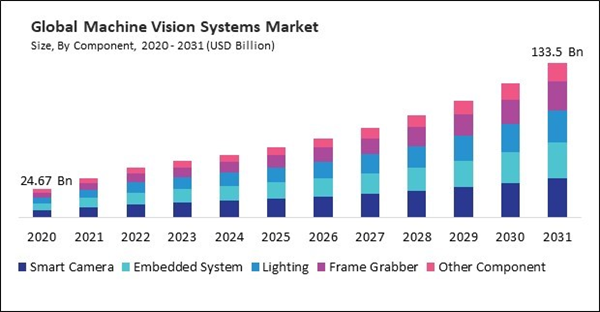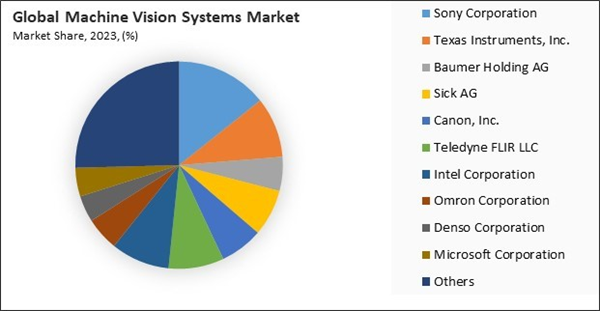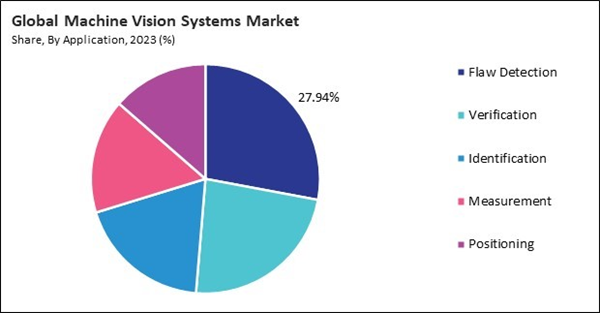The Asia Pacific region witnessed 39% revenue share in this market in 2023. This dominance is primarily driven by rapid industrialization and technological advancements across countries such as China, Japan, South Korea, and India. The region’s strong manufacturing base, especially in automotive, electronics, and semiconductor production sectors, has created a substantial demand for these systems.
The increasing demand for higher-quality products across various industries is one of the primary drivers for the growth of this market. Manufacturers must ensure that products meet strict quality standards as consumers become more conscious of product quality and consistency. These systems, with their ability to inspect and analyze products at high speeds with precision, are ideal for automating quality control processes. Thus, the growing need for quality control and inspection in manufacturing industries drives the market's growth.
Additionally, Worker safety has become a critical concern across industries, particularly in manufacturing environments where dangerous machinery and hazardous materials are commonly found. These systems significantly enhance worker safety by automating dangerous tasks and monitoring work environments in real time. For instance, these systems can detect equipment malfunctions, chemical spills, or unsafe work conditions, alerting workers and managers before accidents occur. In conclusion, industries' increasing need for enhanced worker safety propels the market's growth.
However, The high upfront cost of purchasing, installing, and integrating these systems remains a significant barrier to their widespread adoption, particularly for small and medium-sized enterprises (SMEs). These systems require specialized hardware, software, and infrastructure, all contributing to high capital expenditures. The cost of cameras, sensors, lighting, and the computing power required for processing the images captured by these systems can be prohibitively expensive, especially compared to traditional manual inspection processes. Therefore, high initial investment and installation costs impede the market's growth.
The leading players in the market are competing with diverse innovative offerings to remain competitive in the market. The above illustration shows the percentage of revenue shared by some of the leading companies in the market. The leading players of the market are adopting various strategies in order to cater demand coming from the different industries. The key developmental strategies in the market are Acquisitions, and Partnerships & Collaborations.
Driving and Restraining Factors
Drivers- Growing Need For Quality Control And Inspection In Manufacturing Industries
- Increasing Need For Enhanced Worker Safety In Industries
- Rising Demand For Automation And Industrial 4.0 Integration
- High Initial Investment And Installation Costs
- Complexity In System Integration With Existing Infrastructure
- Government Initiatives And Investments In Automation Technologies
- 3D Vision Systems For Complex Inspections
- Limitations In Handling Complex And Unstructured Environments
- Data Processing And Storage Challenges
Component Outlook
Based on component, the machine vision systems market is divided into smart camera, embedded system, lighting, frame grabber, and others. The embedded system segment held 23% revenue share in this market in 2023. This technology has become increasingly vital in applications requiring high-performance computing, integrated hardware, and low latency. The embedded systems enable vision systems to process complex image data rapidly, making them ideal for industries like automotive manufacturing, electronics assembly, and packaging, where precise, high-speed inspections are necessary.Application Outlook
On the basis of application, the machine vision systems market is segmented into flaw detection, verification, identification, measurement, and positioning. In 2023, the verification segment attained 23% noteworthy revenue share in this market. Verification in machine vision involves checking components or products' presence, position, or correctness in various production lines. It ensures that each item meets specifications and complies with industry standards. This segment plays a key role in the packaging, pharmaceuticals, and automotive sectors, where precise assembly and component placement are critical for functionality and safety.Vertical Outlook
By vertical, the machine vision systems market is divided into industrial, electronics, automotive, healthcare, and other. The electronics segment procured 20% revenue share in this market in 2023. These systems in the electronics industry are primarily used to inspect the assembly and quality of electronic components, such as circuit boards and semiconductors. As the demand for smaller, more complex electronic devices grows, so does the need for precise inspection technologies to detect defects and ensure product quality.Type Outlook
Based on type, the machine vision systems market is categorized into 2D, 3D, and 1D. The 3D segment witnessed 31% revenue share in this market in 2023. 3D machine vision systems capture depth and provide more detailed, accurate representations of objects by generating three-dimensional models. These systems are particularly useful in applications requiring the inspection of complex shapes, surface features, or the precise measurement of objects in 3D space.Regional Outlook
Region-wise, the machine vision systems market is analyzed across North America, Europe, Asia Pacific, and LAMEA. In 2023, the North America region generated 29% revenue share in this market. The United States and Canada are major contributors to this growth, where automotive, healthcare, electronics, and logistics industries increasingly incorporate these systems into their operations. The demand for high-precision inspection, automation, and quality control in manufacturing is driving the adoption of machine vision technologies.Recent Strategies Deployed in the Market
- Oct-2024: Baumer Holding AG has launched the IX series GigE Vision cameras, combining autofocus, optical systems, and lighting in a compact, all-in-one design. These cameras offer quick integration, high process safety, and cost-efficiency, making them ideal for factory automation and industrial image processing.
- Jul-2024: OMRON expands its FH Vision System and FHV7 Smart Camera capabilities by integrating Digimarc watermark decoding. This enhancement improves product identification, packaging verification, and inspection efficiency, enabling faster, more accurate decoding for consumer goods manufacturing and advancing automation and quality assurance in industrial processes.
- Feb-2024: Canon India launched the imagePRESS V1350, a high-performance color toner press, in New Delhi. The printer offers enhanced productivity, media versatility, and precision, receiving positive feedback at PAMEX 2024. Two units were installed, boosting business capabilities for print service providers.
- Apr-2023: Sony Corporation has entered into a strategic partnership with Raspberry Pi Ltd. to enhance edge AI development. By integrating Sony's AITRIOS™ platform into the Raspberry Pi ecosystem, this collaboration enables users to build cutting-edge machine learning and vision applications.
- May-2022: Canon, Inc. partners with Seervision to integrate its PTZ cameras with Seervision’s automated video production software. This collaboration enables seamless camera tracking and automation, enhancing live video production for industries like events, education, and corporate, with improved flexibility and productivity.
List of Key Companies Profiled
- Sony Corporation
- Texas Instruments, Inc.
- Baumer Holding AG
- SICK AG
- Canon, Inc.
- Teledyne FLIR LLC
- Intel Corporation
- Omron Corporation
- Denso Corporation
- Microsoft Corporation
Market Report Segmentation
By Component- Smart Camera
- Embedded System
- Lighting
- Frame Grabber
- Other Component
- Flaw Detection
- Verification
- Identification
- Measurement
- Positioning
- Industrial
- Electronics
- Automotive
- Healthcare
- Other Vertical
- 2D
- 3D
- 1D
- North America
- US
- Canada
- Mexico
- Rest of North America
- Europe
- Germany
- UK
- France
- Russia
- Spain
- Italy
- Rest of Europe
- Asia Pacific
- China
- Japan
- India
- South Korea
- Singapore
- Malaysia
- Rest of Asia Pacific
- LAMEA
- Brazil
- Argentina
- UAE
- Saudi Arabia
- South Africa
- Nigeria
- Rest of LAMEA
Table of Contents
Companies Mentioned
- Sony Corporation
- Texas Instruments, Inc.
- Baumer Holding AG
- SICK AG
- Canon, Inc.
- Teledyne FLIR LLC
- Intel Corporation
- Omron Corporation
- Denso Corporation
- Microsoft Corporation











